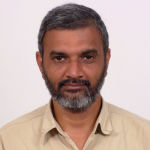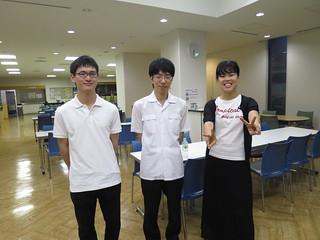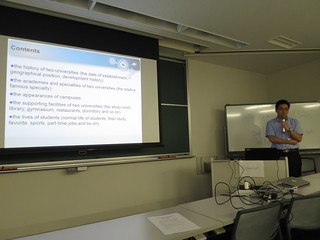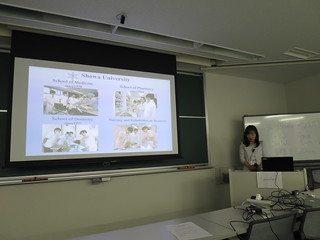 Judge Jenkins recently retired after nearly 18 years as a County Court Judge and approximately 8 years as a Vice President of the Victorian Civil and Administrative Tribunal (VCAT). Pamela currently holds appointments as a Reserve Judge and Senior Sessional Member of VCAT. The County Court (known as the District Court in other Australian States) has a jurisdiction similar to the District Courts in Japan. Prior to her appointment as a Judge, Pamela practised as a solicitor for nearly 20 years, specialising in corporate, tax, property and banking law; and held senior positions in the public sector concerned with the development of policy and legislation, including the establishment of VCAT.
Judge Jenkins recently retired after nearly 18 years as a County Court Judge and approximately 8 years as a Vice President of the Victorian Civil and Administrative Tribunal (VCAT). Pamela currently holds appointments as a Reserve Judge and Senior Sessional Member of VCAT. The County Court (known as the District Court in other Australian States) has a jurisdiction similar to the District Courts in Japan. Prior to her appointment as a Judge, Pamela practised as a solicitor for nearly 20 years, specialising in corporate, tax, property and banking law; and held senior positions in the public sector concerned with the development of policy and legislation, including the establishment of VCAT.
Keynote Presentation
Voluntary Assisted Dying – an Update and Exploration of Related Cultural and Medical Challenges
At the 2016 IAQOL Conference I presented a brief resume of the law relating to voluntary euthanasia and assisted dying regimes internationally and recent proposals being considered by the State Government of Victoria Australia.
In most countries, including Australia, euthanasia and any form of assistance given to hasten the death of a person, even at their request, is illegal.
However, there has been a growing recognition of a person’s right to choose to die when faced with under unbearable suffering from a terminal, incurable and untreatable condition.
In June 2016, a Parliamentary Committee in Victoria Australia tabled a report in the Victoria Parliament entitled: Inquiry into End of Life Choices.
The Committee made comprehensive recommendations relating to palliative care and advance care planning and outlined a proposal for legalising voluntary assisted dying in Victoria.
Since the release of that Committee’s Report, an expert panel was appointed to conduct further consultation and inquiries and recommend, in detail, how the Parliamentary Committee’s recommendations could be implemented.
The final report of the expert Panel was only released on 21 July 2017 and draft legislation to give effect to its recommendations will hopefully be presented to the Victorian Parliament in September 2017.
At the 2017 Conference, I propose to outline in some detail the Voluntary Assisted Dying regime now being proposed by the Victorian Government. The regime is not intended to operate in isolation but as part of an integrated model which also highlights the importance of advance care planning, a doctor patient relationship, family support, exploration of relevant treatment options, supportive health services and palliative care.
The regime now proposed in Victoria is based upon the limited model first adopted in Oregan USA in 1997 and subsequently extended to other States in the USA. The Victorian proposal includes many refinements and has also drawn extensively upon overseas experience. The proposed regime details comprehensive procedures for the protection of vulnerable patients, accountability of all participants and ongoing reporting, monitoring and review of the system.
I also propose to briefly raise for discussion the following topics:
First, how do different cultures think about and prepare for dying?
Secondly, how do different cultural practices and beliefs impact upon the acceptance of any assisted dying proposals?
Thirdly, are there undesirable consequences of advanced medical diagnostic techniques, in particular, the growing incidence of ‘over diagnosis’ and excessive treatment?
Finally, do any of these issues have relevance to the research topics chosen by research scientists, their responsibilities and accountabilities.
Background
Why do we need to talk about dying anyway, particularly at a Conference focused upon the Quality of Life? The answer is simple.
In developed nations at least, following significant advances in diagnostic medicine and health care generally, we are confronted with:
- An aging population; and
- Death following multiple complex pathologies and chronic and degenerative disease.
Indeed, in contrast to death even as recent as 100 years ago, dying has now been turned into a medical experience.
Whilst most physical and associated mental pain and suffering can be alleviated through the provision of better palliative care, it is well recognised that, even with the best medicine and care available, this is not always possible. Consequently, some people are dying terribly at the end of a terminal illness.
Furthermore, in both Australia and other jurisdictions, people have been prosecuted for assisting a loved one to die, with offences ranging from aiding and abetting suicide to attempted murder.
At the 2016 Conference I dealt briefly with the only current options for a patient afflicted with an incurable terminal illness and suffering unbearable physical pain and/or mental anguish, namely:
- Patients can refuse treatment;
- Treatment can be withdrawn or withheld;
- Continuous palliative sedation can be administered; and
- Suicide.
Currently, specific legislation permitting a prescribed assisted dying regime only exists in The Netherlands, Belgium, Canada, Luxembourg, Switzerland, Canada and the States of Oregon, Washington State and California in USA. The approaches taken in each of these jurisdictions vary quite significantly.
I will be reminding the Conference of the key features of the more comprehensive models operating in The Netherlands and Belgium (both since 2002).
I will also refer to a summary of the key features of current international regimes for voluntary euthanasia and assisted dying.
Assisted Dying and Diverse Cultures
SecondIy, I will briefly explore the apparent dichotomy between pursuing quality of life and prolongation of life. These pursuits are further complicated in the context of:
- cultural traditions which focus upon the autonomy of the individual as distinct from the predominance of the group; and
- different cultural and religious perspectives toward dying and death generally.
In the Japanese context, cultural factors and the complex hierarchy of social relationships may make the prospect of laws dealing with voluntary euthanasia and assisted dying far more problematic.
I will briefly explore the recent history of end of life care in Japan, certain critical court cases and the Official Guidelines which have been issued, with particular reference to the circumstances in which life support systems may be terminated.
Excessive Medical Diagnosis and Treatment
Thirdly, I wish to raise whether there are undesirable consequences of advanced medical diagnostic techniques? There is growing concern in the medical profession (without any clear answers) over the tendency, in the most developed countries, for over diagnosis and treatment. This occurs to two circumstances:
First, where multiple tests and investigations, sometimes quite intrusive, are ordered for a patient which may have little or no impact upon ultimate decision making in treatment, particularly for the very elderly; and
Secondly, where a patient, who has no relevant symptoms, is found to have some abnormality either as an incidental finding on screening or where a completely unrelated complaint is being investigated.
While people are living longer, they do so with more disease. Death is increasingly neither quick nor painless and in most rich countries, certainly in Australia, most people die in hospitals or nursing homes, contrary to their preference to be at home surrounded by loved ones.
I will examine the dilemmas facing both the medical profession and the public in dealing with these developments.
Finally, I will pose the question: What does all of this mean for research scientists, such as those attending the Conference; and what responsibility and accountability do they have.

 Mr Satya Sivaraman is currently the Communications Coordinator for ReAct’s Empowerment, Engagement and Network Extension (EEE) that links together a variety of ongoing initiatives to develop national policies and community interventions on antibiotic resistance in Asia, Africa and Latin America. He has been with ReAct since its inception in 2006 developing communication material, key messages, networking with civil society groups. He has also helped to conceptualize ReAct Latin America’s Reimagining Resistance project, that advocates an ecological approach to antibiotic resistance. Mr. Sivaraman is a journalist with over three decades of experience in newspapers and TV channels in South and South East Asia. He has also worked with the United Nations Economic and Social Commission for Asia Pacific and other UN agencies in different capacities. At ICQoL2017 he will be sharing some of the work related to QoL that he had undertaken with ReAct.
Mr Satya Sivaraman is currently the Communications Coordinator for ReAct’s Empowerment, Engagement and Network Extension (EEE) that links together a variety of ongoing initiatives to develop national policies and community interventions on antibiotic resistance in Asia, Africa and Latin America. He has been with ReAct since its inception in 2006 developing communication material, key messages, networking with civil society groups. He has also helped to conceptualize ReAct Latin America’s Reimagining Resistance project, that advocates an ecological approach to antibiotic resistance. Mr. Sivaraman is a journalist with over three decades of experience in newspapers and TV channels in South and South East Asia. He has also worked with the United Nations Economic and Social Commission for Asia Pacific and other UN agencies in different capacities. At ICQoL2017 he will be sharing some of the work related to QoL that he had undertaken with ReAct.




























































































































































